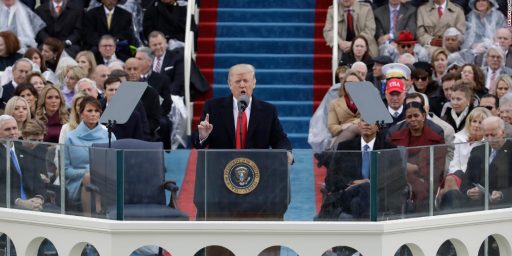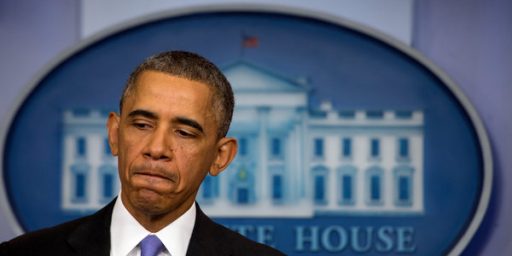GOP Pollster Says May Be Over for Bush
A leading Republican pollster thinks it is too late for President Bush to recover from his low approval ratings.
The recent White House shake-up was an attempt to jump-start the administration and boost President Bush’s rock-bottom approval ratings, but have those efforts come too late to salvage the presidency? A prominent GOP pollster thinks that may be the case. “This administration may be over,” Lance Tarrance, a chief architect of the Republicans’ 1960s and ’70s Southern strategy, told a gathering of journalists and political wonks last week. “By and large, if you want to be tough about it, the relevancy of this administration on policy may be over.”
A new poll by RT Strategies, the firm headed by Tarrance and Democratic pollster Thomas Riehle, shows that 59 percent of Americans disapprove of Bush’s job performance, while 36 percent approve — a finding in line with other recent polls.
Tarrance said it would be extremely difficult for any president to bounce back this late in his administration and reassert influence on Capitol Hill when his approval rating barely exceeds his party’s base support and half of all adults surveyed said they “strongly disapprove” of his performance. An overwhelming 73 percent of independents disapprove of Bush’s performance, and two-thirds of those “strongly disapprove.”
Full disclosure: My wife is a VP at a competing polling firm.
Tarrance may well be right. Certainly, I agree that changes in the White House staff are unlikely to have much impact. Still, there are at least three major problems with his analysis.
First, while pollsters are in an excellent position to guage the public mood and spot trends, they are no smarter than any of the rest of us about what voters will think months, let alone years, into the future. Some issues, such as views on abortion, gun control, and capital punishment, are relatively stable. Public mood and opinion as to whether the country is “on the right track,” by contrast, are incredibly volatile. I doubt, for example, that Tarrance predicted the president’s collapse in the polls two years ago.
Second, Tarrance acknowledges that almost all of the president’s negatives stem from a single issue.
“We will have a referendum on Iraq for the first time in ’06, and the ’08 election may be similar,” Tarrance said. The two years “are going to be relatively bundled together because of Iraq.”
It is not inconceivable that things will have turned dramatically for the better in Iraq by November. Further, it is not only possible but likely that Iraq will be largely off the radar screen by 2008. That’s important since almost everything we know about voting behavior is that voters tend to vote prospectively, not retrospectively, especially when there is no incumbent. Given that the leading GOP candidates for 2008 are John McCain, a senator best known for being a thorn in Bush’s side, and outsiders George Allen, Rudy Giuliani, and Mitt Romney the race is especially unlikely to be a referendum on the previous eight years.
Third, party identification tends to be rather stable. Those who voted for Bush in 2000 and 2004 may be frustrated with the lack of progress in moving the agenda that he campaigned on. Still, they want him to succeed. A few hopeful signs in Iraq and some stabilization in gas prices would send his approval ratings up 10-15 points in short order.






Reminds me of right after the first Gulf war, G. H. W. Bush had approval ratings in the 90s, come the election he was very weak due to the economy. If things get better in Iraq (e.g., catching Zarqawi and such) then Bush could very well bounce back.
If things stay the same or get worse, then he and his party is toast at least as far as the White House goes.
Bush is toast as far as the White House is concerned in 2008 anyway.
That is, unless he pulls a Chavez.
Bush will start bringing the troops home before the fall elections, and with the economy still strong his popularity will go up and republicans will take the elections.
Haha liberals! You have been, are, and will be again the biggest losers!
Chris, Bush is DONE and so is your attitude. Sorry – not.
Bush probably will bring troops home before the job is done for political reason. If he puts politics before America’s well being, he will probably do the same for Iraq.
When Iraq comes apart at the seams, American’s will be asking if it was worth thousands of American lives and hundreds of billions of dollars of our tax money.
Don’t think the strategy will work.
CIA is done. Union or no union, bye!
may be similar,â?? Tarrance said. The two years â??are going to be relatively bundled together because of Iraq.â??
Gee. I could have sworn that somebody mentioned something about Iraq in 2004. I even remember some talk about Iraq before the 2002 elections. http://www.whitehouse.gov/news/releases/2002/10/20021007-8.html
First, we went from 221 republicans in the house elected in 2000, to 229 republicans in the house for 2002 and then to 232 republicans in the house for 2004.
Second, we went from 50 republicans and 50 democrats elected in 2000 to 51 republicans elected in 2002 and then to 55 republicans elected in 2004.
Third, Bush won a clear majority of the popular vote and the electoral college vote and a majority of the states in 2004.
Fourth, if you are following what is going on in Iraq (as opposed to just recycling the lefts talking points that have led to an increase in republicans in 2004), there does seem to be some very positive things occurring in Iraq.
So to say that 2006 or 2008 will be the first referendum on Iraq and then to go further and think that referendums on Iraq haven’t been to the republican’s benefit in purely objective standards (like winning office) as opposed to moral victories (like the Kos 0 for 18 record) is ludicrous.
YAJ: A good point that I had intended to make but forgot. Indeed, by the 2004 election, Iraq was already quite controverial and it was obvious we were in for a longer haul there than most had thought/hoped.
Can’t wait for ’06 and ’08. Boy, howdy!